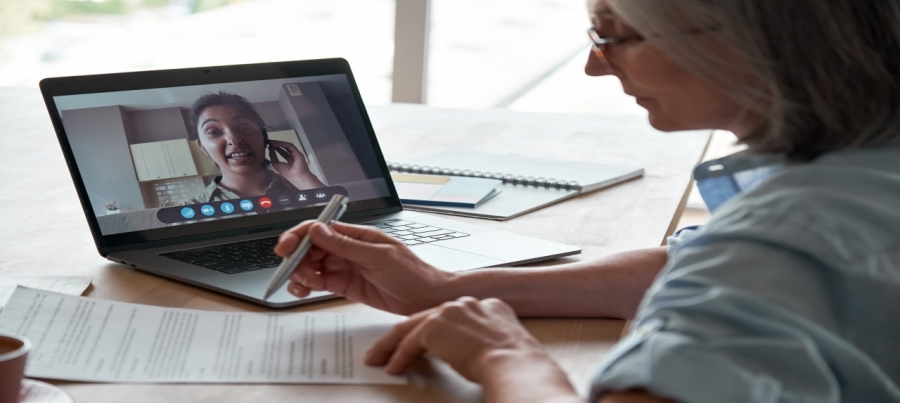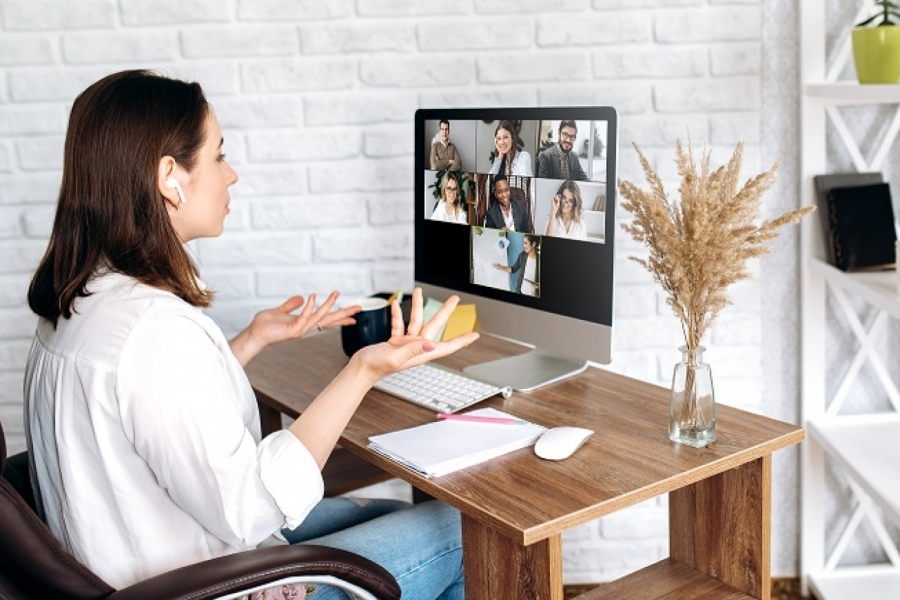Preparing For A Virtual Interview
When it comes to interviews, we have found that a switch to online and remote interviews ,certainly for the initial stages, has become the ‘new normal’ and is set to be so over the next few months. So, with this in mind, we thought we’d give you a few tips to help you succeed.
Test Your Technology
Once you agree to a virtual interview, test your technology ASAP to ensure you are set up properly. Check your internet connection, and confirm your camera and microphone are working well. If the picture is grainy or you’re experiencing an echo, you might need to consider borrowing (or maybe buying) a mini webcam with a built-in microphone.
On the day of the interview, once again, test your equipment and internet connection again - fumbling around with your audio or lighting during the call might not leave the interviewer with the initial impression you desired.
Lights, Camera…all quiet on set!
While testing your technology, determine where to take the interview. Find a room with optimal lighting, preferably near a window, or a blank wall to guarantee you are the focal point of the conversation. Whether you sit on your sofa or in your home office, tidy up your surroundings. It’s difficult to convince employers that you are detail-oriented and organised, when there is laundry visibly piling up in the corner.
Once settled, eliminate all distractions. Turn off the television, silence your mobile phone, and close any nearby windows to muffle noises outside…and make sure that any ‘housemates’ are aware of your need for minimal disruption in the house.
Sit Down Prepared
You want to appear focused and ready to answer any questions. As with a face-to face interview, research the company ahead of time.
The beauty of a virtual interview is you can have a few bullet points written down in front of you ,out of sight – but be careful that you don’t get caught reading off a piece of paper..subtle and discrete ,quick, glances are what’s called for here.
Print out a copy of your CV, so that you don’t forget key talking points. You might want to use a highlighter pen to make key words stand out on your CV, which might help you remember talking points about your experience if you have a case of ‘stage fright’. Once again, discrete glances are crucial here.
Alternatively, why not put key ‘trigger’ words on Post-It Notes around your computer?
As with a face-to-face interview, it is also best to come prepared with answers to common interview questions, such as:
Why are you interested in this role?
What do you know about our company?
What are your biggest weaknesses? (we always say ‘development areas’ rather than weaknesses in answer to this question!)
What do you consider to be your biggest professional achievement?
Tell me about a challenge at work and how you dealt with it.
What are you looking for in a new position?
Why are you leaving your current role?
Avoid memorising each response, so you don’t sound overly rehearsed - again, why not use Post-it Notes that you can stick to your computer. This might do the trick here too…put don’t end up decorating your PC with a ‘collage’ that’s off putting and confusing for you.
You should also be prepared to answer, “Do you have any questions for me?”
What does a typical day in the life of this role look like?
What are the company’s goals this quarter?
How would you describe the ideal candidate for this position?
Where does this role sit in the organisation, and what other groups will I be working with?
Can you walk me through the next steps of the hiring process?
Practice, Don’t Memorise
You don’t want to sound robotic throughout your interview—whether answering or asking questions or giving your elevator pitch. It’s easy to tell if you aren’t being genuine, so it's a good idea to run through a few practice rounds with a friend or family member. While it may be awkward, you’ll have a safe atmosphere to make mistakes and learn from them, so you’re better prepared for the real thing.
It’s important to keep things simple. Don’t feel like you have to give a long-winded answer if the question doesn’t warrant it. Being clear and concise is one of the most important things in a job interview.
Monitor Your Body Language
You can’t firmly shake a hiring manager’s hand or as easily exude enthusiasm via video. But what you can do is monitor your body language.
The main way to communicate confidence is to sit up straight, smile, and keep the camera at eye level.
Dress the Part
You might be sitting near your bed, but you shouldn’t look like you just rolled out of it. Dress as you would for a face-to-face interview.
Make a Connection
You might not know how many interviews a company may conduct for a position. You might be at the end of a long list of people the hiring manager spoke to that day. This is why it's important to make a connection. Don’t be afraid to have a short aside about a common interest. The recruiter might enjoy the break from the routine questions they have to get through.
It’s not easy to connect with everyone, but it’s a crucial part of a virtual interview. You want the interviewer to be able to remember you. This is the best way to prevent yourself from blending in with the other applicants.
You can only be yourself
One of the key tasks for a recruiter is determining whether you would be a good fit for the company’s culture…and also for you to ascertain whether the fit is right for you. This can be challenging during a virtual interview because there is a physical disconnect. It’s more difficult for the interviewer to understand your enthusiasm through the screen, so make sure you’re expressive when answering questions.
Some people will be able to tell if you’re “vibe” fits their company within a first meeting. Give them a reason to push you through to the second round of interviews by shining a light on how you can help the organisation.
Immediately Follow Up
Again, as with a face-to-face interview, follow up within 24 hours of the interview by sending an individual thank you email to everyone you met. Not only will it show you value their time, but it provides you the opportunity to resell yourself and express the unique strengths you bring to the role, or share any talking points you forgot to address.
If there was something specific you bonded over, mention that in the email so you stay top of mind. Or if an interviewer brought up a particular business challenge, use the follow-up as a way to propose potential solutions. But keep the email concise; you want your note to leave a lasting impression.
Fail to prepare, prepare to fail!
Ultimately, the key to acing a virtual interview is proper preparation. From ensuring your technology is working to conducting research before the meeting, sitting down at your computer poised and ready for any and all questions will help set you apart from other applicants.
We’d like to wish you good luck and every success in your interview.
And finally - Don’t forget to call your recruitment consultant after the interview to give feedback!





